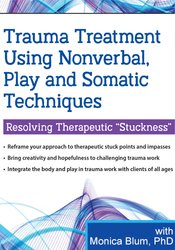

Has your work with traumatized clients ever left you feeling stuck or like you are looping in unproductive cycles? Have you found the harder you work to help your most vulnerable clients, the more defended they seem?
If you’ve answered yes, welcome to the challenges faced by all trauma therapists.
Dr. Blum has spent her career taking the nonverbal/play-based interventions she uses with traumatized children and has “grown them up” to successfully unfold impasses in her work with traumatized adults. In this heavily experiential workshop, Dr. Blum will teach you a variety of practical, easily accessible, and intuitive nonverbal, play, and somatic-based techniques that open new pathways to shift the blocks in trauma work.
Dr. Blum interweaves practice with theory, examining how the neuroscience of trauma and attachment theory supports the importance of using the right brain-based approaches you will learn. The techniques you will practice are informed by evidence-based trauma treatments (e.g., Mindfulness, Sensorimotor Psychotherapy, Accelerated Experiential Dynamic Psychotherapy, and Play Therapy).
Watch this recording and reframe how to work with therapeutic impasses to promote movement and healing with your clients.
Through hands-on practice with a smorgasbord of nonverbal, play, and somatic interventions you will develop skills and bring new tools to your work with clients of all ages. This workshop aims to inspire your motivation, creativity, and flexibility in working with trauma.
| File type | File name | Number of pages | |
|---|---|---|---|
| Manual ZNM052460 (13.60 MB) | 34 Pages | Available after Purchase |
Monica Blum, PhD, has worked with children, adolescents, adults and families for
over 25 years. Stemming from her training as a child trauma therapist, Dr. Blum has “grown up” play and nonverbal/body-based techniques to fit clients of all ages. Dr. Blum practices eclectically, blending psychodynamic, family systems, and relational approaches with right brain-focused therapies including Play, EMDR, Internal Family Systems, Sensorimotor and Accelerated Experiential Dynamic psychotherapies. Dr. Blum has developed embodied mirroring a body-to-body, relational technique that respectfully and creatively allows the therapist-client dyad to move through therapeutic impasses. She authored an article detailing this technique in the Journal of Psychotherapy Integration (2015). Dr. Blum conducts workshops on embodied mirroring, the use of right brain-based techniques in trauma work, child sexual abuse treatment and assessment, and parenting. She provides consultation and supervision for professionals and graduate students.
Speaker Disclosures:
Financial: Monica Blum is in private practice. She receives a speaking honorarium from PESI, Inc. She has no relevant financial relationships with ineligible organizations.
Non-financial: Monica Blum is a member of the American Psychological Association.
The Impasse and “Stuckness” in Trauma Treatment
Primary Process Communication
“Body Language” – Somatic Interventions
The Language of Play
Mindfulness: Shifting from Reacting to Mindfulness and the brain
Mirroring: “Self” Development, Attunement, & Affect Regulation
Please wait ...